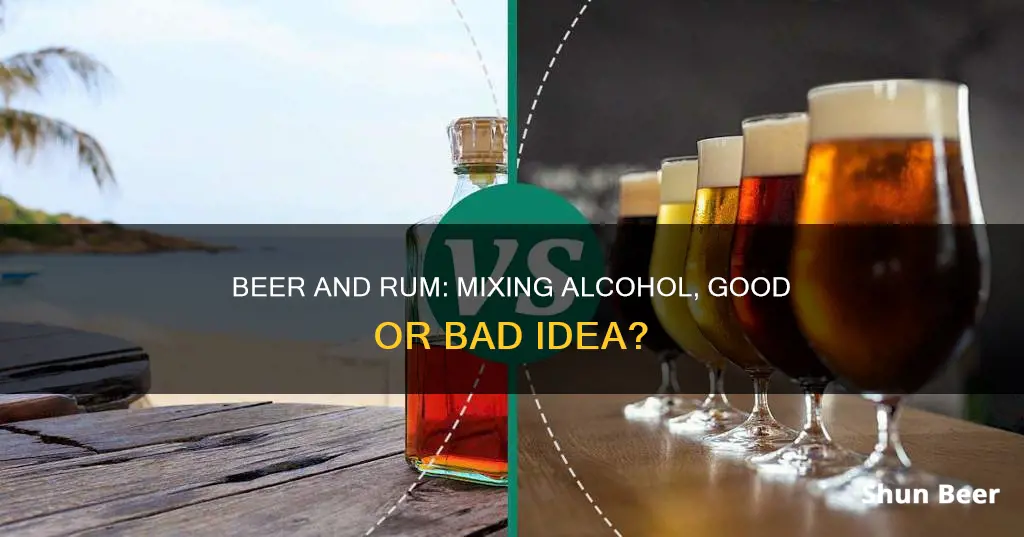
There are many theories and myths surrounding alcohol consumption, and one of the most common is the saying, Beer before liquor, never been sicker; liquor before beer, you're in the clear. This phrase suggests that drinking beer after rum or any liquor will make you sick. However, this is just a myth, and the order of your drinks does not matter when it comes to avoiding a hangover or getting sick. The amount of alcohol consumed and individual factors such as genetics, food intake, and frequency of drinking play a more significant role in how you feel after drinking.
| Characteristics | Values |
|---|---|
| Whether drinking beer after rum will make you sick | No |
| Whether drinking order affects hangover severity | No |
| What does affect hangover severity | Amount of alcohol consumed, whether you ate, how frequently you drink, genetics, congeners, smoking |
What You'll Learn

The order of drinks does not matter
The amount of alcohol you consume and the time over which you consume it are the main factors that will determine whether you experience a hangover. The more alcohol you drink, the more likely you are to have a hangover. Additionally, drinking alcohol too quickly can lead to a hangover, regardless of the type of drink. So, whether you drink beer, rum, or any other alcoholic beverage, the key to avoiding a hangover is to drink in moderation and pace yourself.
Other factors that can affect your risk of a hangover include whether you ate before drinking, how frequently you drink, genetics, congeners (compounds found in alcoholic beverages that can contribute to hangovers), and smoking. Eating before drinking can slow down the absorption of alcohol, but it will not prevent a hangover if you consume too much alcohol. Heavy drinkers are more likely to experience hangovers, and repeated heavy drinking may increase the severity of hangovers. Genetics can also play a role, as your genes influence how your body metabolizes alcohol and how alcohol affects your sleep, hydration, blood sugar levels, and blood vessel dilation.
In conclusion, the idea that the order of drinks matters is just a myth. The most important factors for avoiding a hangover are the total amount of alcohol consumed and the rate at which it is consumed. So, whether you drink beer, rum, or any other combination of alcoholic beverages, drinking in moderation and at a steady pace is the best way to avoid a hangover.
Chug Beer Like a Pro: Tips to Drink Fast
You may want to see also

Drinking beer after rum may not make you sicker
The idea that drinking beer after rum will make you sick stems from a few theories. One theory suggests that most people start their evenings with drinks that have a lower alcohol content, such as beer, and then move on to liquor as the night progresses. So, if they get sick at the end of the night or feel terrible the next morning, they blame it on the drinking order. Another theory suggests that liquor's high alcohol content is more likely to spike your blood alcohol levels quickly compared to beer. Therefore, finishing the night with liquor after drinking beer can quickly push your already elevated blood alcohol content over the edge, contributing to a hangover.
Despite these theories, the order of your drinks does not affect your hangover. This is because alcohol begins to be absorbed into your bloodstream as soon as it reaches your stomach. So, by the time a hangover takes effect, all the alcohol you drank the night before will have been absorbed. As long as the total amount of alcohol you consume remains the same, there is no reason why drinking beer after rum would make you sicker than drinking rum after beer.
The likelihood of experiencing a hangover depends on various factors, including the amount of alcohol consumed, whether you ate before drinking, how frequently you drink, genetics, congeners, and smoking. Therefore, drinking beer after rum may not make you sicker, but it is important to consider these other factors to reduce the risk of a hangover.
Beer vs Liquor: Which Drink is More Harmful?
You may want to see also

Drinking too much of any alcohol can make you sick
Drinking too much alcohol of any kind can make you sick. Alcohol is a drug, and like all drugs, it can damage your body, especially if you drink heavily or binge drink. Even small amounts of alcohol are linked to the development of certain diseases, including numerous cancers.
The short-term effects of drinking too much alcohol can include a hangover, alcohol poisoning, falls and accidents, conflict, lowered inhibitions, and risky behaviours. The severity of a hangover often depends on how your body metabolises alcohol, but it typically also depends on how much you drink. Generally, the more you drink, the more likely you are to experience a hangover. However, some people can experience a hangover from just one drink.
Drinking on an empty stomach can also increase the chances of feeling unwell, as food helps slow the rate of alcohol absorption. Alcohol irritates the lining of the stomach and intestines, slows digestion, and increases fats in the liver and stomach, which can cause an upset stomach and nausea.
Other factors that can affect your risk of a hangover include the type of alcohol you drink, how often you drink, your genetics, and whether you ate before drinking. Dark-coloured alcohols, such as brandy, rum, or whiskey, are more likely to cause a hangover. Additionally, heavy drinkers are more likely to reach blood alcohol concentration levels that lead to hangovers, and repeated heavy drinking may increase the severity of hangovers.
The long-term effects of alcohol consumption are also significant. Alcohol contributes to more than 200 different types of diseases and injuries, including cardiovascular disease, cancers, nutrition-related conditions, mental health conditions, and cognitive impairment.
Tech Football and Beer: What's Allowed?
You may want to see also

Carbonated drinks can irritate the stomach lining
Secondly, carbonated drinks can contain additives such as sugar, caffeine, and artificial sweeteners, which can irritate the stomach and have negative health effects. For example, caffeine can aggravate irritable bowel syndrome (IBS) and cause diarrhea, especially if consumed during exercise. Artificial sweeteners can have a laxative effect, pulling water into the colon and mobilizing stool, which can lead to diarrhea.
Thirdly, while studies have not shown a consistent link between carbonated drinks and chronic conditions like gastroesophageal reflux disease (GERD), those with these conditions may find that carbonation worsens their symptoms. Carbonation can slightly alter pH levels in the body and increase pressure in the stomach and intestines.
It is important to note that the effects of carbonated drinks on the stomach can vary from person to person. While some people may experience stomach pain, bloating, and gas, others may not notice any adverse effects.
Beer at Work: German Work Culture Explored
You may want to see also

Pacing and drinking in moderation are key
The myth that the order of drinks matters may have originated from the idea that carbonated drinks like beer and sparkling wine can irritate the stomach lining, increasing the rate of alcohol absorption. However, scientific studies have shown that the order of drinks has little to no effect on hangover severity. A study published in the American Journal of Clinical Nutrition found that changing the order of drinks made no significant difference to the hangover symptoms experienced by participants.
Instead of focusing on the order of drinks, it's important to practice pacing and moderation. This means being mindful of how much alcohol you're consuming and spacing out your drinks over a longer period of time. Drinking too much alcohol in a short period can lead to negative consequences, such as getting too drunk or experiencing a hangover the next day. It's also important to remember that drinking on an empty stomach can worsen the side effects of alcohol consumption and bring them on faster. Eating before drinking can help slow down the absorption of alcohol and may delay the feeling of drunkenness.
Additionally, alternating alcoholic beverages with water can help reduce the amount of alcohol consumed and promote hydration. Drinking water before bed and the next morning can also help reduce the severity of a hangover. While it's not possible to completely avoid a hangover, pacing, drinking in moderation, and staying hydrated can help minimize the negative effects of alcohol consumption.
Beer and Plavix: What You Need to Know
You may want to see also
Frequently asked questions
The order in which you drink different types of alcohol does not matter when it comes to hangovers. It is a myth that drinking beer after rum will make you feel sicker.
People believe that drinking beer before liquor can make you sick because carbonated drinks like beer can irritate the stomach lining, increasing the rate of alcohol absorption. However, this is a myth.
No, it does not. The amount of alcohol you consume and the time across which you consume it are more important than the type of drinks you have or the order in which you have them.
No, it does not. The order in which you drink different types of alcohol does not affect the severity of a hangover.
The best way to avoid a hangover is to not drink on an empty stomach, not smoke, and limit how much and how often you drink alcohol.







